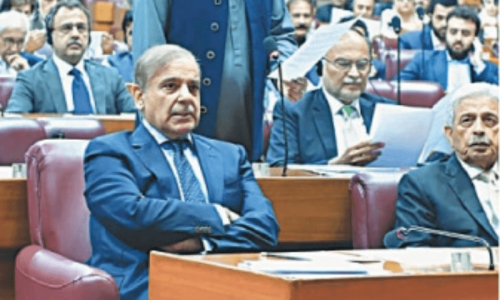 ISLAMABAD, Feb 28: Poppy cultivation has resumed in Pakistan that had been declared a poppy-free country in 2002, said United Nations Office on Drugs and Crime (UNODC) representative Vincent McClean.
ISLAMABAD, Feb 28: Poppy cultivation has resumed in Pakistan that had been declared a poppy-free country in 2002, said United Nations Office on Drugs and Crime (UNODC) representative Vincent McClean.
He was speaking at the launch of the International Narcotics Control Board (INCB) 2005 annual report here on Tuesday.
Poppy is now being cultivated in areas previously not known for its cultivation, including certain parts of Balochistan, Khyber, Kohistan and Kala Dhaka.
The cultivation is being done on a limited scale but the UNODC official feared the problem may intensify and the country can once again become a major growing centre.
Poppy crop in Balochistan was completely destroyed, but in NWFP it could not be wiped off, the official stated without elaborating the reasons why the crop could not be fully destroyed in the Frontier. However, he said, UNODC was in an active engagement with the NWFP government.
Mr McClean pointed towards the risk of HIV/Aids transmission through injecting drug use. Although the INCB report did not specifically pointed out Pakistan for alarmingly high rates of HIV infections among injecting drug users, but he said it was a fact that HIV was a concentrated epidemic among injecting drug users in the country.
“There is a risk that this epidemic could break out in the general population,” he cautioned, as he recalled the remarks of a former Anti-Narcotics Force chief who referred to the HIV - injecting drug use link as a ticking time bomb.
The report noted that Pakistan had the second highest number of opiate seizures in 2003.
The UNODC representative said his agency was undertaking a national survey of drug abuse to determine the level, trend and pattern of drug use including that of injectibles. This would support government’s deliberations on the issue.
In reply to a question, Mr McClean said the support from Pakistan government departments engaged in drug control had been appreciable, but UNODC was never fully satisfied with the government agencies and would like to see more resources committed for eradication efforts.
Furthermore, he said, a large number of donors were willing to support Pakistan’s drug control programme. The UNODC representative looked to have reservations about Pakistan’s criminal justice system as he observed while responding to a question that it (criminal justice system) faced numerous challenges linked to resource constraints, low public salaries and low morale.
“The situation is not confined to Pakistan, but it is certainly harder for the country because of resource constraint.” The INCB report noted that there was evidence of smuggling of pharmaceuticals from India into Pakistan through Dubai.
The board, however, welcomed resumption of talks between India and Pakistan which has given an impetus to combat drug trafficking, particularly along the border between the two countries.











































Dear visitor, the comments section is undergoing an overhaul and will return soon.